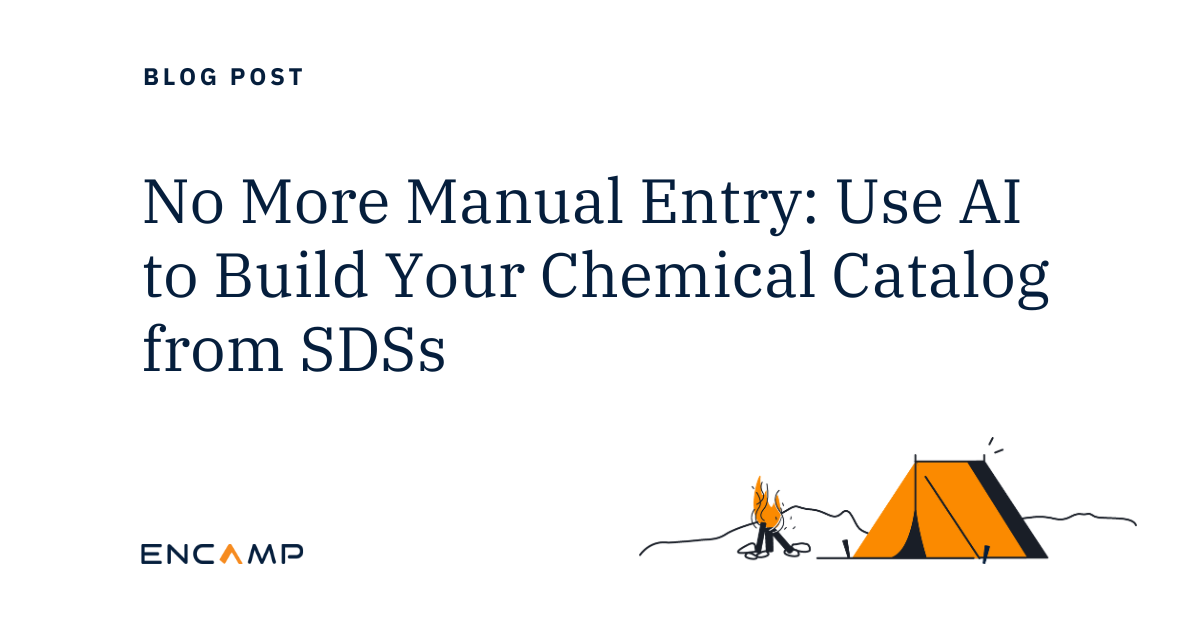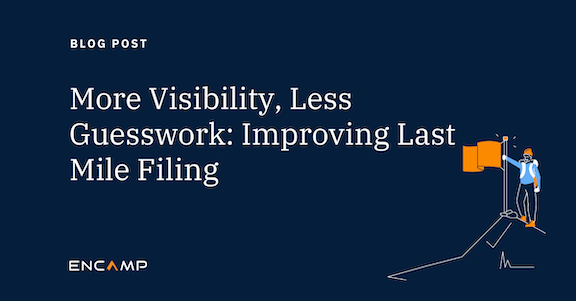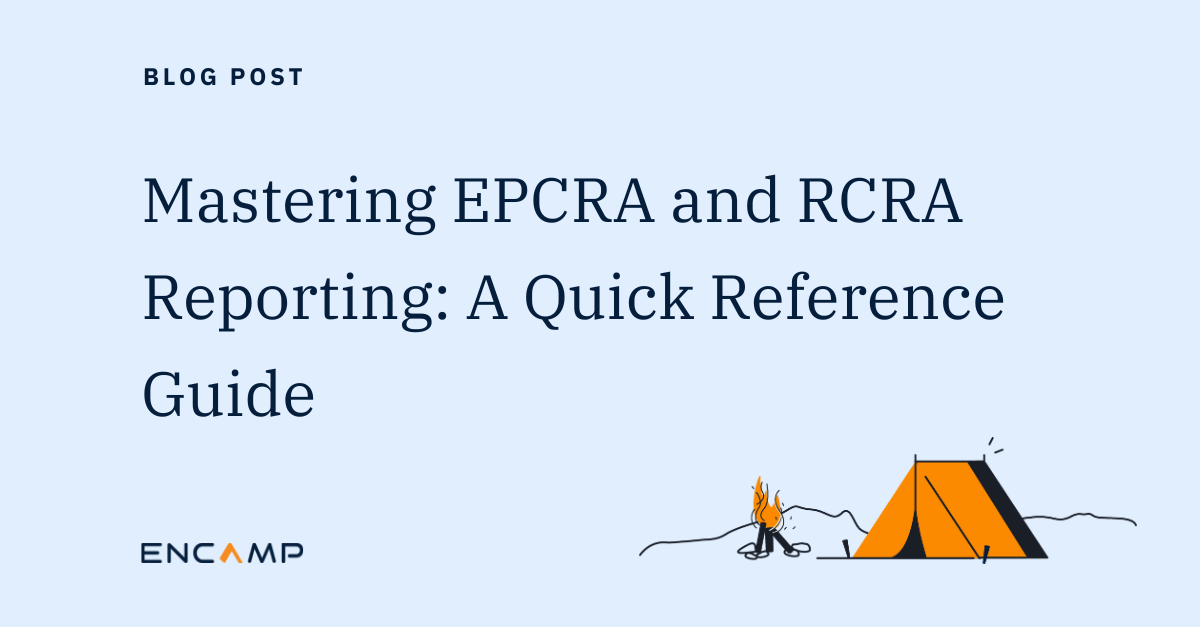Add Encamp CEO and co-founder Luke Jacobs to the Forbes 30 Under 30 class of 2022, where he’s been recognized in the category for Enterprise Technology.
Members of the 30 Under 30 lists in their respective categories are selected based on factors ranging from funding and company revenue to social consciousness and impact, climate awareness, inventiveness in technology and services, and personal and business potential. Nominee shortlists are reviewed by each category’s four-judge panel of Forbes reporters, editors and invited experts, who then select the final 30 listees in their assigned category.
In marking the 10th year of the 30 Under 30 list, 70% of the 2022 members are founders or co-founders of companies — joining alumni like Daniel Ek, co-founder and CEO of Spotify, Whitney Wolfe Herd, who started Bumble, and Drew Houston, who co-founded Dropbox. Others on the 2022 list have introduced notable innovations that will seed emerging companies in the future. Collectively, the class of 2022 has also raised over $1 billion in funding for their entrepreneurial efforts.
Imagining a “new world”
“Much of 2022 was being freshly created by this group back in 2012,” said Alexandra Wilson, the editor of Forbes Under 30. “Ten years from today, it’s a good bet we’ll all be living in a new world being imagined today by the entrepreneurs, innovators and entertainers that make up our 10th Anniversary class.”
As Jacobs said of his 30 Under 30 recognition, “It takes a village at Encamp. I appreciate everyone’s hard work to make the company successful and continue obsessing about our customers. We’re only at the beginning of this journey and I’m so proud of the work that we’re accomplishing together.”
Jacobs was also recently appointed to the Forbes Technology Council, an invitation-only organization for senior-level executives who are selected for their knowledge of and diverse experience in the tech industry.
Here in large part is why Forbes included Jacobs as a member of its prestigious 30 Under 30 list for 2022.
The initial vision for Encamp
Jacobs, who earned his B.S. in Environmental Science, co-founded Encamp in 2017 after working as an EHS consultant for Fortune 10 companies and experiencing the inefficient processes of environmental compliance reporting. For decades, such reporting had been performed manually — and often inaccurately — using spreadsheets, paper records, and disjointed data management systems. Compliance data itself had also historically been questionable and poorly managed.
The aim of Encamp was therefore to create technology to digitize reporting data, centralize and validate it, and automate the report submission process.
“My thinking was,” Jacobs said, “If we could make large enterprises even 1% more efficient in the way they manage compliance reporting, the impact of that is vast at scale.” Just as he envisioned, Encamp has become an operations company born from the compliance management technology it created.
Using the Encamp platform, companies efficiently move packets of data from their regulated facilities to their environmental operations teams and compliance professionals for reporting. Encamp further creates a traceable “paper trail” to know where data comes from and increase data visibility to gauge and ensure its quality.
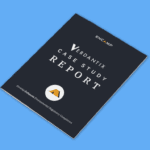
In effect, Encamp’s technology is the unifying data speck that enables companies to mitigate the risks of reporting errors and non-compliance violations, a claim supported by the EHS analysts at Verdantix in their recently published Encamp Case Study Report.
Encamp’s ongoing mission is to create a world where
good for business can equal good for the environment.
On environmental sustainability and ESG
Some of the other reasons Forbes selected Jacobs for their 30 Under 30 2022 list are his views on how enterprise technology, the environment, sustainability, and compliance reporting intersect in the business world. We asked him about his thoughts on sustainability and ESG in particular.
What important message do you think should businesses share when it comes to environmental sustainability?
Jacobs: Businesses should definitely focus on transparent reporting and knowing where their data comes from and where it lives. The ability to measure the progress of their sustainability initiatives offers greater clarity for investors and better decision making for the business itself, especially ones that are consciously addressing their impact on the climate.
How can companies make their data accessible for environmental sustainability?
Jacobs: Sustainability and making data readily accessible is a must, which in turn makes digitizing sustainability data vital. When environmental compliance data pipelines are digitized and standardized, it improves data collaboration and accessibility. Ultimately this lets businesses provide transparent, honest data to investors and consumers as well as the general public.
Do you think there’s a lag in making this data accessible, and if so, why?
Jacobs: Sustainability starts by knowing where your data comes from and where it lives. A business’s holy grail is the data they collect, manage, and interpret, and the data accessibility issues we see most at Encamp are businesses not knowing where their data is. When this happens, it typically results in inconsistent reporting metrics across the organization, and data that’s inaccurate and of poor quality.
How can businesses use ESG sentiments to measure sustainability or evolve their brand?
Jacobs: Organizations can benefit from ESG sentiments in their brand by empowering the company and employees to get involved with sustainability initiatives, both internally and externally. At Encamp, for instance, we’ve aligned with non-profits such as One Tree Planted to plant a tree for every Tier II compliance report we file on behalf of our customers. We’ve already surpassed 18,000 trees, and we know the number will continue to grow substantially as we increase our customer base. Many of our employees even donate to the One Tree Planted cause, and we constantly encourage them to volunteer for other similar mission-driven environmental efforts.
Measuring these efforts and making them visible adds to the momentum necessary for effective sustainability programs. It also evolves a company’s brand to genuinely reflect the desire to make an impact on an individual and corporate level.
Would you say environmental compliance is the backbone of beating climate change?
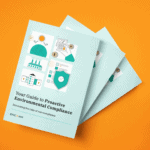
Jacobs: Environmental compliance is essential to combating climate change, particularly in making large-scale action involving corporations possible to protect the environment. We must continue to translate global climate initiatives into regulations that establish compliance requirements for businesses and countries to abide by, track towards, and regularly report on.
At the same time, companies and their EHS and Operations teams must take a more proactive approach to compliance itself, which we talk about in Encamp’s eBook on Proactive Environmental Compliance.
On starting Encamp, its strengths, and staying inspired
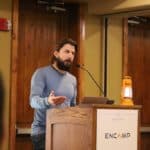
What surprised you most about starting a company?
Jacobs: One of my mentors told me early into building Encamp that you’re always going to overestimate what you can accomplish in one year, and underestimate what you can accomplish in five years. I’ve been surprised by how true that has been. A year after co-founding Encamp, we had achieved less than I had expected. Now we’re four years in, and we’ve accomplished more for our customers and as a company. I’ve really learned that growing a company and really innovating in a field takes years — but after multiple years it’s possible to make incredible progress.
What do you feel is Encamp’s biggest strength right now?
Jacobs: From a financial perspective, our net revenue retention is absolutely amazing. The fact that Encamp has 6- and 7-figure deals as a startup (that’s only had employees for three years) is a strong underlying signal of the enterprise value we deliver. From a solutions perspective, Encamp has process power in how we’re thinking about environmental compliance from a first principles perspective and leveraging next generation technology to create order of magnitude efficiency increases at scale for our customers.
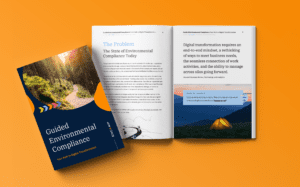 We’re a technology company competing in a managed service provider space, and by automating compliance reporting and building digital transformation tools and practices into the process, we have a lot of competitive differentiating abilities compared to a consulting firm. Those two aspects of Encamp are extremely strong and provide a ton of value to our customers, as does our Guided Environmental Compliance method that blends our high-tech software with the high-touch support of our compliance and technology experts. We explain the method in our Guided Environmental Compliance eBook.
We’re a technology company competing in a managed service provider space, and by automating compliance reporting and building digital transformation tools and practices into the process, we have a lot of competitive differentiating abilities compared to a consulting firm. Those two aspects of Encamp are extremely strong and provide a ton of value to our customers, as does our Guided Environmental Compliance method that blends our high-tech software with the high-touch support of our compliance and technology experts. We explain the method in our Guided Environmental Compliance eBook.
What qualities and skills do you look for in emerging leaders?
Jacobs: In a startup, being a self starter is the most important trait of a leader. It’s not corporate. There’s not an established playbook. Lots of things are ambiguous because you’re continuing to ideate them out and make them real. Another principal quality of an emerging leader is a real desire to lead, not because you want to be “the leader” or have a title, but because you sincerely want to help guide and grow organizational functions. Being a good communicator and listener and possessing general intelligence never hurts, either.
Many entrepreneurs turn to mentors at some point in their journey. How do you view mentorship?
Jacobs: Most people, especially if they’re further along in their career, love to help entrepreneurs who are putting themselves out there. Even before starting Encamp, I’ve always focused on getting mentors to discuss my ideas with them and hear their thoughts. The knowledge they have is invaluable, and mentors are vital to your own self-discovery and self-drive.
Final question. How do you stay inspired?
Jacobs: I try to find the things I really enjoy about the process of building Encamp and changing how companies manage their compliance operations and the process of compliance reporting. We truly have introduced a better way of managing data and reporting that for decades was an archaic manual process. So I always try to see this bigger picture and realize I’m much more satisfied being on this journey than not. Building a company is a marathon, not a sprint, and it’s changed how I prioritize my life and my day.
Transforming the way enterprises stay in compliance
Encamp is on a mission to create a world where good for business can equal good for the environment. We help enterprises transform compliance programs and human processes into a technology-driven system that lays the foundation for accurate and ongoing environmental compliance through a blended method of intelligent high-tech solutions and high-touch expert support.
Tom Bailey
Tom is the Senior Content Writer at Encamp. And like all other Encampers, he’s in tune with the environment and what happens to it. He’s been writing about creative technology solutions for longer than he cares to admit.




 We’re a technology company competing in a managed service provider space, and by automating compliance reporting and building digital transformation tools and practices into the process, we have a lot of competitive differentiating abilities compared to a consulting firm. Those two aspects of Encamp are extremely strong and provide a ton of value to our customers, as does our Guided Environmental Compliance method that blends our high-tech software with the high-touch support of our
We’re a technology company competing in a managed service provider space, and by automating compliance reporting and building digital transformation tools and practices into the process, we have a lot of competitive differentiating abilities compared to a consulting firm. Those two aspects of Encamp are extremely strong and provide a ton of value to our customers, as does our Guided Environmental Compliance method that blends our high-tech software with the high-touch support of our 